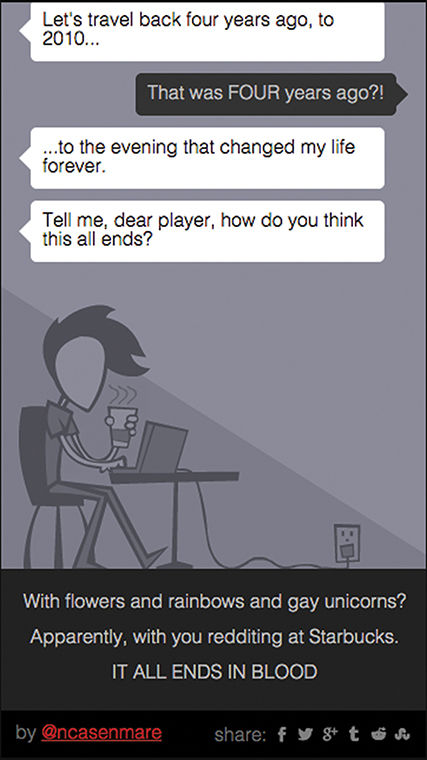Real emotions run deep in ‘Coming Out Simulator 2014’ video game
March 2, 2015
“Coming Out Simulator 2014” is exactly what the title implies. Those who have never experienced the very personal process of coming out as gay or bisexual can now get a sense of what the experience entails with “Coming Out.”
Originally released in June 2014, the game, now available in a mobile-friendly browser version, remains completely free to play and was recently announced as a contender for the Excellence in Narrative Award at the Independent Games Festival. The game offers a fresh perspective to players who have never gone through this experience. “Coming Out” reinforces the belief that reenactment is the best way to understand it, and the game fosters one of the strongest feelings of empathy possible, short of actually coming out.
Creator Nicky Case, known online as Nutcasenightmare, rose to prominence in 2008 through Newgrounds.com, a website that hosts Flash animations and games of all kinds. He first gained recognition through his “The Game” series, a satirical trilogy of games lampooning popular culture, political events and Internet memes. His most recent work, “Parable of the Polygons,” is a collaboration with mathematician and YouTube vlogger Vi Hart and serves as a playable experiment on the nature of gentrification. Case has proven himself not only as a game designer but also as an artist. His projects tend to provoke and question cultural and societal norms more than aim for complex gameplay.
The argument about whether games are a form of art is a tired one. Realistically, games are equal to all other forms of creative media. Whether a specific game is a work of art or not depends on the intent of its creator. While each game may have artistic qualities it shares with other works—games or otherwise—art needs to be creative and somewhat novel. This can be a hard pill to swallow for some game enthusiasts because games are primarily sold as a form of entertainment—a perception that often promotes the idea that all games must be fun, and those games that are not are simply bad.
“Coming Out” is not the most playful game. Its simple interface is designed to mimic that of a text message conversation, prompting players to pick from three dialogue options in response to certain lines from the game’s characters. This game does not need mechanical fidelity, though. It is more in line with what Telltale Games creates—a narrative-driven game that intends to capture a scene, or in Telltale’s case, a fictional story and world. “Coming Out” is meant to tell a story honestly and relies on the player’s investment in the story.
Case describes the game as a story of half-truths. The game’s story is a slightly fictionalized account of Case coming out to his family. Players can choose to respond to the conversations with Case’s family members very directly, dance around the issue or remain mostly silent. The conversation initially occurs between Case and his mother, but eventually his father joins in. The game offers three alternate endings, and all three are revealed in the order the player chooses.
The game fits snugly within the recent renaissance of vignette games that rely more on capturing one particular moment than just attempting to cast a broad net or tell an epic tale. “Coming Out” captures something some might consider mundane but manages to transform the experience into one that feels realistic and important. Even heterosexual players can learn from the game and appreciate how relatable it can be through its simple yet meaningful interactions.
The game is not only accessible, but it also accomplishes its goals in a mere 20 minutes. “Coming Out” induces a constant stream of emotions and can draw empathy from even the most cynical individuals.








